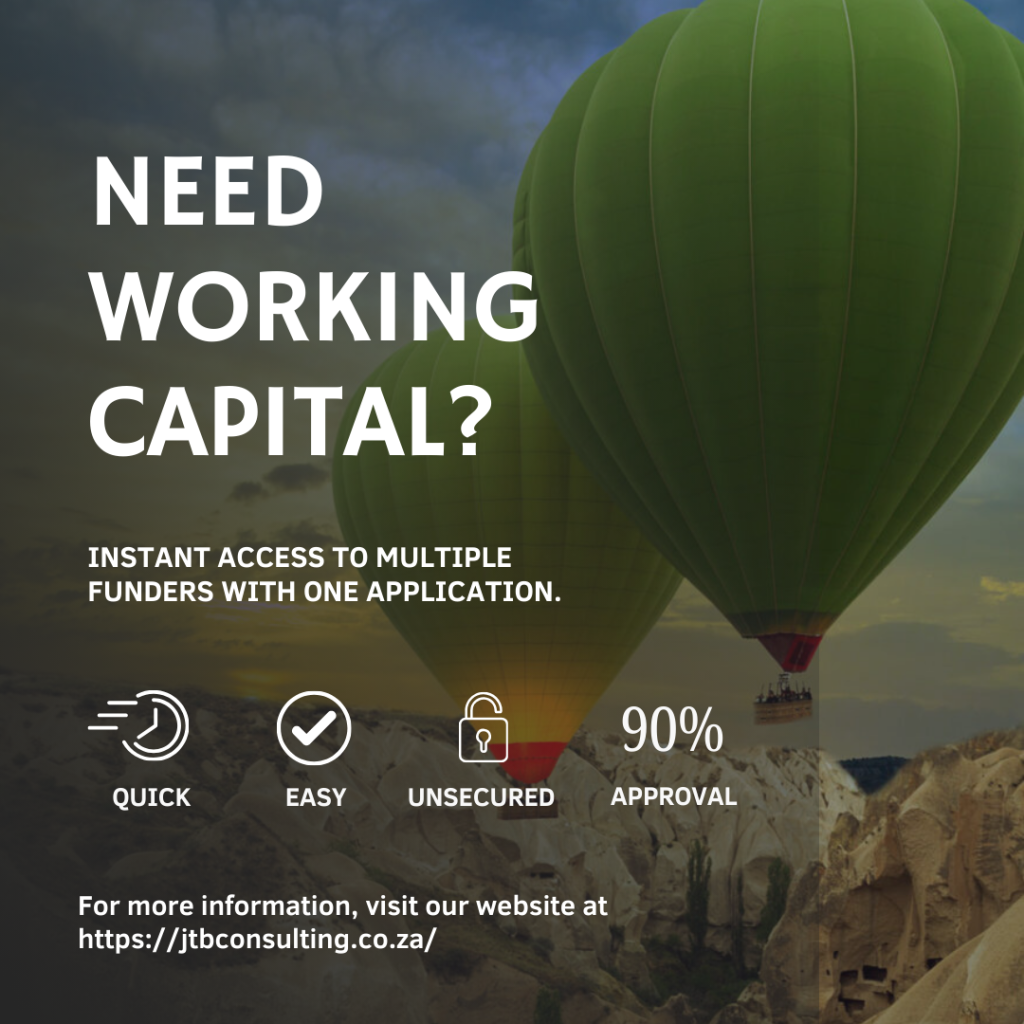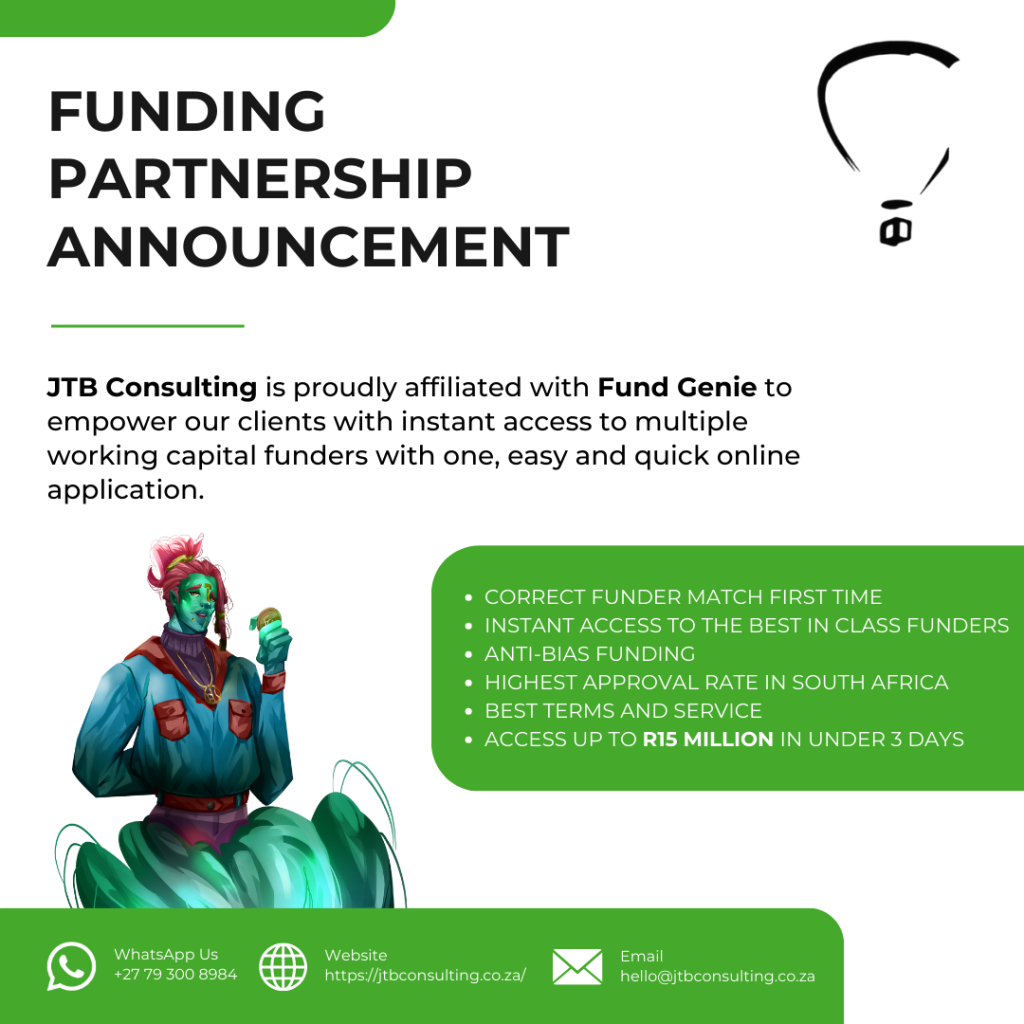There are many occasions when businesses require funding, especially startups, which will have to identify suitable Startup Business Funding options.
Small business funding options range from Government Startup Funding to Seed Funding. A startup funding option everyone is aware of is Friends, Families, and Fools (I will discuss this below). In principle, there are two main startup funding types: Self-funded and funded by third parties such as investors or banks. However, this view falls short of capturing the many nuances in how startups get funding.
Need Working Capital Funding?
Click here to apply within 10 minutes, and if approved, you will receive your funding within 5 working days. It’s Quick and Easy. Unsecured Funding, with Access to Multiple Funders, one Application, and a 90% Approval Rate!

All the entrepreneurs and startups I meet every week have some variation of the same question:
- What business funding for startups in South Africa can I access?
- How do I get funding to start a business in South Africa?
- What is startup funding?
- How do I get funding for my startup?
- How are most startups funded?
Often, leaders must become creative to organise the capital they need to grow their businesses. This article discusses traditional funding but goes beyond traditional sources and will explain ten potential small business funding options for businesses and startups.

Of course, not all of them will be suitable for any startup, but many times more potential funding sources are available than just the obvious ones. The task here is to open the eyes to all potential alternatives to obtain funding sources for startups to start new businesses. Before diving into this article, why not take a look at some more advice from our team contained in our article Startup Funding and 8 Costly Mistakes to Avoid.
Small Business Funding Option #1: Bootstrapping
Bootstrapping is one of the most common forms of funding for small businesses. When we look at the meaning of “Bootstrapping”, we can define it as starting a new business with little to no capital and reinvesting first profits into the business to grow it. As such, Startups that use bootstrapping do not take on external financing sources and rely on their means to achieve growth. Bootstrapping puts the entrepreneurs in a very tough spot as such startups typically are cash-strapped and must carefully turn every Rand before spending it.
The good thing is that this incentivises entrepreneurs to find innovative and cost-effective solutions because such is needed to survive. Another plus is that bootstrapped businesses are not dependent on external financing providers. Therefore, the founder will remain in complete control of the startup. Before speaking to investors, look at these top questions they will ask, as highlighted in our article 10 Investor Questions You Will Be Asked.
Small Business Funding Option #2: Family, Friends, and Fools Funding (3Fs)
When considering external funding options, most startups face the main problem of nobody knowing or trusting the founders since there is zero credibility at the beginning. As they don’t have any credibility, the potential circle of potentially interested investors will be limited. One way to enhance credibility is to take on first investors. So, the first natural step to obtaining funding for a startup will be to check with Family, Friends, and Fools Funding, called the 3 Fs, and ask them for funding.
The main advantage here is that Family and Friends know the founders and are ready to trust them. On the other hand, family and friends might not be sophisticated investors. In reality, they are not investing in the business idea itself but in the founder(s) because they like and wish to support them.
Personal and business affairs are the main topics of taking on family and friends as investors. Especially if a startup isn’t successful and loses its funds, this can lead to ugly conflicts and disputes. Friendships can quickly end over such things. Therefore, the actual cost is the risk of losing those friendships.
The Fools are another investor category because they usually are the people the founders get to know when they start pitching their idea. Significantly investing in Startups in the Seed stage is inherently risky since many variables are in motion, ranging from the quality of the startup business idea, the founders’ commitment, the ability to execute, and the flexibility to adjust a business plan as needed. So, any reasonable person would have a large number of reasons why not to invest.
Therefore, only the fools will be left to invest at the very early stage. Nevertheless, fools are very valuable as they are the followers who can bring an idea to life. The bottom line is that this investor category strongly believes in the founders for personal reasons. Therefore, family, Friends, and Fools Funding (3Fs) are the most accessible investors you can access.

Small Business Funding Option #3: Crowdfunding
Crowdfunding is another funding option that Startups can consider getting funding for startups. The main idea here is to offer an alternative financing method using a pool of interested investors. There are different participation schemes in how crowdfunding can work in principle:
- Equity
- Debt
- Products
- Donations
Raising equity and debt from a large pool of private investors usually is subject to applicable capital market laws to protect those investors. However, these laws add a lot of administration and compliance requirements to the process. Moreover, these laws may even be prohibited in certain countries. Therefore, these two participation schemes are more difficult to implement and less common.
What has become quite common in today’s Crowdfunding marketplaces is raising funding to develop or produce new products. These are usually new and innovative products that are not yet available today. Instead, creative entrepreneurs have developed concepts, designs, and prototypes and need funding to bring those projects to life. When you ask for funding, you will be asked to provide financial projections. Take a look at the 7 Reasons on Why Financial Models are Important.
Small Business Funding Option #4: Angel Investors
What are Angel investors? Angel investors – or business angels – are private individuals, often wealthy, and possess entrepreneurial backgrounds. They usually possess a higher risk tolerance than other investors as they are more familiar with the entrepreneurial journey and the typical pitfalls. They invest for personal reasons, like the excitement of being part of innovative ideas, witnessing entrepreneurial journeys, or targeting abnormal returns in exchange for higher-risk investments.
Angel investors typically fund startups in their early stages and face high-risk plays. Angel investing is demanding; every investment comes with many risks and unknowns. Therefore, the experience and investment know-how make an angel investor successful.

The calculation goes like this. Investing in Startups is inherently risky. Therefore, an angel investor can only invest a small part of his net worth in startups, estimated at maybe 5% to 10%, for example. As a rule of thumb, they can expect only 1 out of 10 startups to succeed. The others might fail in the worst case.
Furthermore, a startup might need additional funding rounds in the future, so an angel investor might also want to reserve some of his capital for an add-on investment to avoid diluting. Let’s say an angel investor has a net worth of R100 Million.
How much can they invest in a single Startup?
- Net worth R100 Million
- Only 5% of the Net Worth to be invested in a portfolio of Startups: R5 Million
- 40% of Funds (R2 Million) will be reserved for future financing rounds and 60% to be invested in new startups (R3 Million)
- The business Angel targets to invest in a diversified portfolio of 20 Startups
- R3 Million divided by 20 is R150,000, which the business angel can invest in a single Startup
This calculation shows how a business angel might tick and calculates the size of a possible investment ticket (R150,000). The calculation also means that a Startup will often have to approach several business angels as the required funding will often exceed the financial means of a single angel investor.
Therefore, angel investors often team up with other business angels in so-called business angel clubs. Apart from the social and networking aspects, the advantage here is that sharing deal flow, research, opinions, and know-how becomes easier.
Furthermore, it is more practical since a Startup will have to find multiple angel investors anyway. Therefore, sharing know-how, opinions, and research about startups with other angel investors makes the investment process easier for Angel Investors. The Bottom line is that securing Angel investors are an attractive option for Startups.
Small Business Funding Option #5: Startup Grants for Small Businesses
Another funding option is grant funding for small businesses. The main benefit is that a grant does not need to be paid back. Grants usually are available from endowment funds, governments, or other organisations seeking to support a particular purpose. Therefore, using a grant requires typically strict compliance with the grant’s criteria and reporting requirements to ensure the funds are spent in an intended manner.
As grants are not profit-oriented, they usually do not use bank-like lending criteria and can be easier to obtain. One advantage is that grants can already be available in a startup’s early seed phase. Another advantage is that a grant is a “gift” that does not need to be paid back and will not dilute the equity ownership of the startup’s founders. Therefore, if startups can access a grant and comply with the grant requirements, a startup business should use the available grant funding options.
Small Business Funding Option #6: Family Offices
Another investor type potentially interested in investing in a Startup is a family office. Family offices are – the same as business angels – private individuals or family members who need to manage their wealth and systematically protect their interests. The origins of a family office typically date back to a successful entrepreneur.
However, as parents may have several kids, the family grows over a generation, and the individual member’s interests could potentially conflict with their business interests. For example, some family members want to sell; others want to run a company. Many times, the goal of the family office is to put in place family rules on how to keep and manage the wealth and ensure they can transfer wealth to the next generation to protect the founder’s legacy.
The main difference between a Family Office investor and a Venture Capital investor is that family office investors usually are not exit-driven. Instead, they follow a long-term investment strategy to build wealth over generations and do not need to chase short-term returns. Securing such a long-term investor typically makes the life of a Startup much more accessible than dealing with an exit-driven investor such as a Venture Capital firm. However, family offices willing to invest in Startups are challenging to identify, and usually, only a few will invest directly in Startups.
Want to Speak to me Directly? I am more than happy to discuss your requirements in greater detail. Contact me via my LinkedIn Profile.
Small Business Funding Option #7: Venture Capital
Venture capital (VC) investors are a particular type of private equity that focuses on investing in startups instead of established businesses. Like Private Equity Funds, Venture Capital firms normally create investment funds funded by Limited Partners (LPs), which they manage as a General Partner (GP).
Such a fund typically lasts 7-10 years and includes a performance scheme to reward the General Partner for outstanding financial returns. Important to note here is that the realisation of financial returns will require an exit event where the VCs can sell the startup so that the VC can realise a financial return. Return expectations typically range between 20% – 35% Internal Rate of Return on the invested capital by the fund.
What Startups need to know about VCs:
For startups, it is essential to understand that Venture Capitalists are exit-driven and need to create superior returns. They intend to invest in high-growth startups, leading to a successful exit at a much higher valuation. Therefore, VCs are under pressure to deliver those high returns to satisfy the financial performance promises they make to their Limited Partners. Therefore, Venture capitalists usually look at investing in Startups from a purely financial perspective. They will also base their investment decision on whether the expected Internal Rate of Return (IRR) of their investment case meets their minimum return targets or not.
The implications for Startups are that they need to be aware of this and prepare thoroughly for a discussion with VCs. The best is if Startups prepare their business and financial plans to show VCs how they generate their return, making funding discussions easier. VCs are professional investors who possess significant know-how and experience investing in Startups. In exchange, they might expect significant shareholder participation and protection rights and are exit-driven. Startups must meet the predefined investment criteria set out by the VC firm.
Small Business Funding Option #8: Equipment Leasing
Another kind of funding option for startups to consider is Equipment Suppliers. Many times, equipment suppliers selling Trucks, Agriculture Equipment, Injection Moulding Machines, or other types of equipment will offer two possibilities to purchase the equipment:
- Purchase
- Leasing
The outright purchase option is the traditional way of paying for the equipment in cash. The alternative is if the equipment supplier can offer a leasing arrangement. It works because the equipment can be paid in instalments during a leasing period of typically 2-7 years (depending on the type of equipment). In this case, the equipment supplier will carry the risk if a startup cannot pay.
The equipment supplier can carry such risk because they know their equipment very well, and if something goes wrong could take the machinery back and sell it to somebody else. Often there will be a second-hand market for such machinery, and the equipment supplier can access a pool of alternative buyers if needed. In addition, this can be a very lucrative business opportunity for an equipment supplier.
The startup will often be obliged to purchase the maintenance service and a service level agreement from the equipment supplier, leading to stable revenues. Equipment suppliers often have relationships with financing providers so that leased equipment can be re-financed in a back-to-back agreement with a bank or a specialised leasing financing firm. In addition, the equipment suppliers can adjust the equipment price for the risk reflected by an interest rate included when calculating the monthly or quarterly leasing rates.
The adjustments can lead to higher profit margins than a cash sale. So overall, offering equipment financing can be an appealing additional business opportunity for an equipment supplier. However, this still requires the startup to pass the equipment supplier’s due diligence.
Possible due diligence criteria for equipment leasing might be the following:
- Evidence of a source of revenue (e.g., a contract for producing certain parts which would require the use of the machinery)
- Know-how and ability of the lender to operate the machines
- A Business Plan and financial projections can demonstrate that the startup will have the financial ability to service the lease as per the agreed period (typically 2-7 years leasing period)
For equipment leasing or financing, the machinery will remain in possession of the equipment supplier until the end of the leasing period. The startup can often buy machinery at a remaining pre-agreed price.
So overall, using equipment financing can be an attractive additional funding source for a startup. Leasing costs are typically cheaper than offering an equity stake, so it’s a cheaper form of financing than equity capital. The downside is that servicing the leases reduces free cash flows, and equipment financing is unavailable for every type of equipment.
Small Business Funding Option #9: Bank Financing
The second last funding option for startups we consider in this article is bank financing. Bank Financing is usually a very challenging funding source compared to all other startup funding types, as startups do not precisely meet the preferred lending criteria many banks will use. Here is a reminder of what kind of standard lending criteria banks typically have:
Bank Lending Criteria:
- Established business model
- Track record with many years of profitability
- Business plan available that clearly outlines how to service a loan
- Stable cash flows and profits
- Available Assets which can be used as collateral
- Availability of equity financing which can absorb risk
Ways to obtain Bank Financing for Startups:
Let’s consider some exceptional cases where startups can obtain bank financing.
- Properties / Mortgages: When buying a property, the property has value and serves as collateral. Therefore, banks might accept offering a mortgage to a startup when a startup purchases a tangible property. Furthermore, banks also can set a Loan-to-Value (LTV) ratio typically in the range of 65% (commercial properties) to 80% (residential properties) to a lower limit if they deem the risk to be higher. Finally, if something goes wrong, the bank can claim the property in foreclosure and auction it off on the market to recover its money.
- Guarantees from credible third parties: Startups’ major problems are their lack of credibility and track record. For this reason, banks typically avoid this risk. However, it will be different if credible third-party steps in here and guarantees this risk. Please note that every guarantee provider will have additional criteria a startup needs to meet and will do his due diligence.
- Guarantees from a parent company: If a startup is owned or invested by an already established company with a solid relationship and track record with bank financing, it would also be possible that such an investor could guarantee the startup to cover an eventual loss. Typically, the way to go here is to first negotiate with the investor and introduce the idea of providing an additional guarantee to obtain bank financing (a so-called recourse loan). However, not all investors will accept this as it will add to their risk. Investors will only do this if they strongly believe in the startup or have additional motives to require a product for themselves. For investors, this can be super risky.
Need a Business Plan? Then Contact South Africa’s #1 Business Plan Company
Small Business Funding Option #10: Government Funding
The South African government offers several funding options for small businesses. Some Government Funding Options available include SEDA and the IDC.
Ranging from grants to incentives, each offers some form of financial support for entrepreneurs, including:
- Full or cost-sharing grants are usually not repayable. Grants less than 100% require you to fund the balance of finance required for the project.
- Incentives are grants in that you do not have to repay the money. However, unlike grants, where the money is provided for the service or asset, incentives are paid after the event. Tax Incentives mean that the business may deduct a certain amount from the money it owes in tax.
- The government also offers equity funding, meaning that the government funding agency buys a certain part of your business in return for percentage shareholding. The equity provides you with the finance to grow the business, and the investor receives a share of the profits and a lump sum when they exit.







